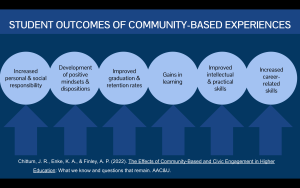The benefits of service learning/community engaged learning for students, faculty, academic institutions, and community members have been well documented over the last 25 years (Astin et al., 2000; Eyler & Giles, 1999; Eyler et al., 2001). Most recently, the Association of American Colleges & Universities released a synthesis of studies conducted in the last decade (2012-2022) on the effects of community-based engagement in higher education (Chittum et al., 2022).
Recent research not only suggests that community-based High Impact Practices have a greater impact on student outcomes than those that are campus-based (Valentine et al., 2021), but also illuminates the magnitude of positive effects on student outcomes across HIPs as both individual experiences (e.g., research on first-year experiences, research on service learning) and in aggregate (e.g., the cumulative effect of students experiencing multiple HIPs or the combined effects that stem from merging two or more HIPs).
Impact on students
- Research shows that service learning/community engaged pedagogy increases student engagement and quality of student learning, and community engaged learning provides students with opportunities to develop civic engagement skills.
- By working with community members, students enhance their group, organizational, and interpersonal skills.
- Students gain a better understanding of themselves as they explore ways to contribute to their communities, develop self confidence, and develop an enhanced commitment to public service.
- Students also gain important experience working with members of their communities with different backgrounds, lived experiences, and world perspectives.
Impact on faculty
- Research shows that service learning/community engaged pedagogy enhances quality of teaching, increases outlets for faculty expertise and opportunities for faculty research, and accommodates a wide variety of student learning styles.
- Service learning/community engaged faculty report that it brings positive recognition from academic departments, institutions, and professional associations and networks.
Impact on institution
- From an institutional perspective, research shows that community engaged learning improves student satisfaction with college, increases student retention, and enhances community relations.
Impact on community
- Community partners report they benefit from faculty expertise and additional resources provided through student service to support research and other organizational objectives that advance their agencies’ mission they might otherwise not have the resources to undertake.

UNCA Key Center Annual Reports
2022–2023 Annual Report
- Highlights: Community Partner Database, Staff Community Service Leave Day, new additions to the team, cultural programming, and Community Engaged Scholars
2021–2022 Annual Report
- Highlights: Service Learning Courses, Community Engaged Scholars, student-led events and service programs, and the Key Center Arts & Impact series